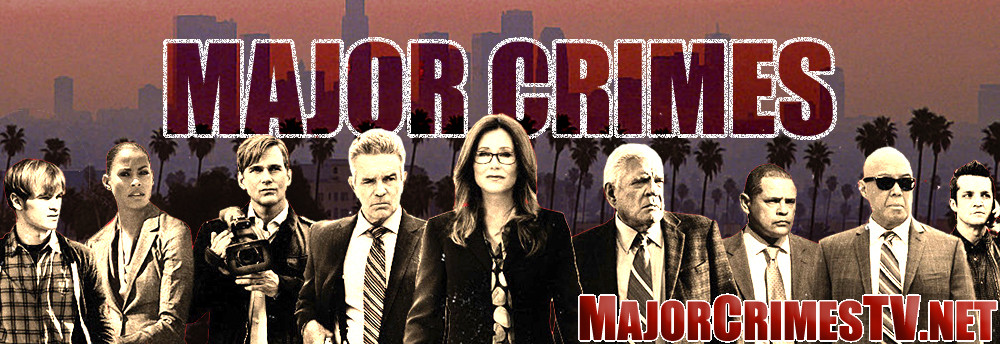By Mina Sharpe
Tweet
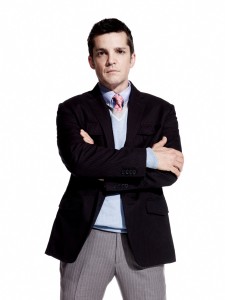 Jonathan Del Arco has often been, in his own words, an outsider. But, rather than seeing this as a liability, Del Arco hails that perspective as one of his greatest strengths. As he notes, many of the characters he has played – from Hugh the Borg on Star Trek: The Next Generation and Sophia Lopez on Nip/Tuck to his current role as Dr. Morales on Major Crimes – stand outside the mainstream. When asked about his history for making memorable impacts in smaller parts, Del Arco says that playing the role of the “outsider”, whose actions become vital to the story, is something he relishes. “There’s a certain challenge to taking something that is on face-value small and making it an integral piece of a plot that you can’t do without. If you really dig deep into Morales’s arc, within the context of all The Closer and Major Crimes episodes, there is a definite effect he has on the story and the way we view the crime. In a way he is sort of the eyes of the audience in that he comments, for example, on Brenda’s annoying qualities, or at Captain Raydor’s insistence on rules.”
Jonathan Del Arco has often been, in his own words, an outsider. But, rather than seeing this as a liability, Del Arco hails that perspective as one of his greatest strengths. As he notes, many of the characters he has played – from Hugh the Borg on Star Trek: The Next Generation and Sophia Lopez on Nip/Tuck to his current role as Dr. Morales on Major Crimes – stand outside the mainstream. When asked about his history for making memorable impacts in smaller parts, Del Arco says that playing the role of the “outsider”, whose actions become vital to the story, is something he relishes. “There’s a certain challenge to taking something that is on face-value small and making it an integral piece of a plot that you can’t do without. If you really dig deep into Morales’s arc, within the context of all The Closer and Major Crimes episodes, there is a definite effect he has on the story and the way we view the crime. In a way he is sort of the eyes of the audience in that he comments, for example, on Brenda’s annoying qualities, or at Captain Raydor’s insistence on rules.”
And for Del Arco, that experience as “viewer”, looking in on the mainstream, is more than just an act. As he notes, “That outsider perspective is something I understand really well. I think the edge I have as an actor is that I have a different point of view than a lot of other people because of my background.” At the age of 10, Del Arco and his family moved from Uruguay to the United States, where they encountered all of the challenges that new immigrants face. But, in the midst of what could have remained a profoundly alienating experience, he discovered how the arts, and television in particular, could bridge the distance from outsider to insider. In the first few months in America, he says, “I learned English by watching television. So I was exposed to television at a really early age as this powerful tool, because I was able to learn the language basically over the summer, just by watching TV.”
The positive force of creativity carried over into his school years, where his involvement in the arts provided a haven from the bullying he experienced in the larger system; support from teachers and fellow drama students gave him the community he hadn’t been able to find. “I became involved in school plays. I had kind of a rough time when I was a kid because I was gay so I was bullied a lot. I found solace in the drama club, where pretty much everyone accepted you as you were and I had these friends I hung out with and I had some really great mentors in my teachers.” When one of those mentors, his music and drama teacher, told him he should take a chance and try to make it as an actor in New York, Del Arco took the advice and headed to the city at the age of 16 to study theatre.
Seeing Matthew Broderick, then himself a young and relatively unknown actor, win the Tony Award for Brighton Beach Memoirs inspired Del Arco to take an inventive approach to finding his earliest acting jobs- by giving his headshot to stagehands at the box offices of Broadway theatres. His resourcefulness paid off, leading to his first audition and his first Broadway show and an early and successful career on stage and television. But, Del Arco says, he soon got bored of the work coming his way, and wanted to learn more about the craft, so he returned to acting class. “I’ve continued to grow since then. Acting is definitely one of those things that you do get better at with age, because our work is based on human experiences, so the more of those experiences you have, the more access you have to memories that increases your ability to identify with a character”.
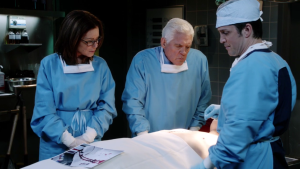 That Major Crimes itself tends to not follow the many of the standard devices of crime procedurals gives Del Arco more flexibility in bringing these life experiences into his portrayal of Morales. “I kept teasing James (Duff), ‘well you know on every other procedural the coroner IS as a series regular’. But Major Crimes and The Closer are like no other procedural, because they don’t follow a formula like so many others. This one has its own quirks, as you know, some episodes are comedic, they all have different tones, it has its own world, so I never fit into this stereotypical role of the procedural grim faced coroner, thank God!.” As for his character in particular, Del Arco says he’s not sure how the writers plan to bring in more Dr. Morales, “they have to figure out ways to include me in the story without giving away the plot or solving the crime too quickly”
That Major Crimes itself tends to not follow the many of the standard devices of crime procedurals gives Del Arco more flexibility in bringing these life experiences into his portrayal of Morales. “I kept teasing James (Duff), ‘well you know on every other procedural the coroner IS as a series regular’. But Major Crimes and The Closer are like no other procedural, because they don’t follow a formula like so many others. This one has its own quirks, as you know, some episodes are comedic, they all have different tones, it has its own world, so I never fit into this stereotypical role of the procedural grim faced coroner, thank God!.” As for his character in particular, Del Arco says he’s not sure how the writers plan to bring in more Dr. Morales, “they have to figure out ways to include me in the story without giving away the plot or solving the crime too quickly”
Regardless of what this new season brings, Del Arco is thrilled with the way The Closer has shifted into Major Crimes, bringing with it a more ensemble-focused show. “It’s kind of a fantastic artistic exercise for James Duff and the writers. Over the seven seasons of The Closer all these characters were introduced and the fans grew to love us without knowing very much about us (with the show focused tightly around Kyra Sedgwick’s character). And now it’s like an onion being peeled and you get to see the deeper levels. I think if you go back and watch The Closer now, it’s almost like you could read more into it, because you know more about each one of the characters.”
Del Arco laughs when asked about one of the questions he gets asked the most from fans: What is Dr. Morales’s first name? He likes to jokingly say that it is “Doctor”. “I don’t know when we’re going to know his name. I would imagine knowing the writers and the way James likes to tell stories, that it’ll either be at the most unexpected and irrelevant moment where it sort of comes up, or it’ll be at a moment when we’re dealing with Morales’s personal life. I know some of what’s happening with Morales in relation to a few other characters with some big storylines this year, this may be a time when my first name comes into play. I definitely think Brenda and Dr. Morales got very close to first name basis. They were good friends but we just never got to that place where she would refer to him by first name at work. It’ll happen on Major Crimes. For me, I’m perfectly fine just being Dr. Morales.”
Though he has been officially promoted to full-time cast member this season on Major Crimes, Del Arco doesn’t feel like the promotion will change much of his relationships on set. “To be honest, that family of The Closer and Major Crimes has always treated me as one of the tribe. Del Arco also excitedly points out that Major Crimes had its episode order increased to 19 this season (the only one of TNT’s original dramas to receive such an extension). “It’s going to be great, and I think the fans are going to be really excited. The scripts have been amazing so far. We are shooting one next month that when I finished reading my hands were literally shaking, it was that disturbing and intense. It’s really, really great writing, so it’s exciting that they have this opportunity to crank out four more, and frankly it will give us the opportunity to develop our characters even more. It’s going to be a really great year.”
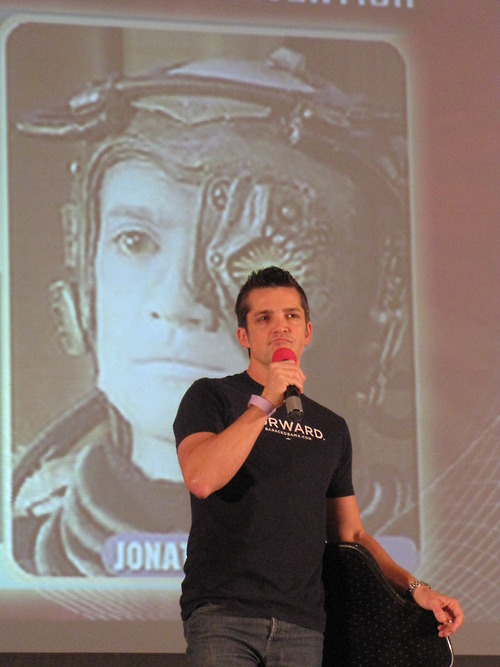
Jonathan Del Arco at the Star Trek Las Vegas Convention, August 2012.
Photo Credit: MajorCrimesTV.net
Del Arco carries this commitment to character development into social media, where he frequently participates in live-tweeting episodes and responding to fan questions. When asked how he feels about the experience, he likens it to a virtual version of another popular fan event he participates in. “You know, it’s sort of like when you’re out there at a Star Trek convention, you get asked a lot of really nitty gritty questions about the show that you have to answer on the spot on a stage. But with twitter, it’s sort of there, if you want to answer it great, if not you can just ignore it. Sometimes I ruffle a few feathers if I get too political but it’s fun. I like it. It’s an interesting tool. I know a lot of actors are having troubles, tweeting something and then realizing ‘oh my god that’s not just to my friends, that’s to people who don’t really know me’. I have a few tweets that I deleted when I realized, ‘yeah, that’s not going to be interpreted correctly’, because I do have kind of a Morales sense of humor and if you can’t see my eyes rolling, you won’t know I’m being facetious.”
That willingness to combine art and politics has been a defining feature of the work Del Arco does outside the studio, stretching back to his time in New York and his work in theater during the early days of the AIDS epidemic. As he describes it, “It wasn’t really a period, back in the eighties, where you could be a successful actor and be out of the closet.” Alongside that homophobia, AIDS took a tremendous toll on young men in New York. “I was very young and I was in a relationship with a young man that died. So I understand the AIDS epidemic firsthand.” This immediate experience of crisis changed things for Del Arco. “It was a really difficult period in which I became an activist out of anger. Seeing young people die, friends, members of your community while our government did nothing about it…if that doesn’t wake you up nothing will!”
Today, advocacy and activism are defining aspects of Del Arco’s career. Del Arco notes that “what being an actor does is give you a microphone with which to talk about issues. Actors also have an advantage because we know how to make people feel. That’s a great tool to have when you’re fighting for a cause.”
When asked about his current work with the Gay, Lesbian, and Straight Educational Network (GLSEN), Del Arco says, “I’m essentially a fundraiser. I like to keep my day job for a lot of reasons. One of them is that it keeps me very grounded into reality and accountable to other people. I work with organizations that deal with bullying of gay kids in schools. The work we do is across the country at over 4000 different schools. We have campaigns that we do around the year, to teach kids, even the younger kids, how to not call each other names, how to not bully each other, giving teachers tools for which to deal with bullying and how to prevent it. I was bullied as a kid myself and I had the hutzpah and the spine and the friends and the family really to survive it. But not all kids have the equipment to weather that sort of thing. A lot of people sort of roll their eyes and say everyone gets bullied in school and you should be okay with it. Well, not everyone is okay with it. A lot of kids end up killing themselves. That’s something that I am really passionate about and a great deal of my day is spent working on raising funds for GLSEN.”
As for what specifically television can do for embattled minorities, Del Arco points out that the entertainment industry, as with all other areas of society, can be on the right or the wrong side of history. “There are still movies and publications and TV shows that use slanderous language against gay people. That is still happening, and it sends a really bad message to kids. And the message is that if you are a ‘fag’ or a ‘dyke’ or even ‘gay,’ all these words are used with a negative connotation. They are all signs of weakness; they are signs of being different. The term ‘that’s so gay’ is used to refer to something negative as opposed to something positive. It does have an effect and that is one area that not all of Hollywood has gotten on the same page about. I respect creative freedom and freedom of speech. But when you know that what you’re doing is hurting children you should think twice. Is it really necessary for the expletive against a certain community to be in that text?”
Despite these continuing problems, however, Del Arco also suggests that television has also played a crucial role in the fight for equality. “I think the entertainment industry has been pivotal in changing perception of gay people. Look at Will and Grace. When that show first came on the air, no one would have ever dreamt of having gay jokes, gay characters being explored in a pop show. I remember noticing the cultural change, especially among young people, walking on the beach with my partner back when the show was on the air. I remember seeing some young girls looking down the beach at us and they yelled, ‘you are such a cute couple,’ and I thought ‘wow.’ That would have never happened when I was growing up.”
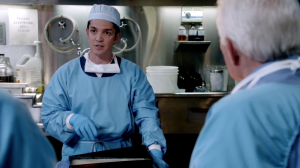 Del Arco sees television’s ability to normalize different lifestyles evolving over time. “A character like mine (on Major Crimes) pushes the envelope even further because my being gay is completely irrelevant to how good I am at my job. It’s not a big point to be made, it’s just one of the people at work in the city of LA. Trust me, there are plenty of gay people at work, in the LA morgue and the LAPD.”
Del Arco sees television’s ability to normalize different lifestyles evolving over time. “A character like mine (on Major Crimes) pushes the envelope even further because my being gay is completely irrelevant to how good I am at my job. It’s not a big point to be made, it’s just one of the people at work in the city of LA. Trust me, there are plenty of gay people at work, in the LA morgue and the LAPD.”
These battles over civil rights, however, are not over, as Del Arco is also quick to point out, and the media still has work to do. “I played a really amazing character on Nip/Tuck who was transgender. Being Transgender on TV is still slightly taboo. I think that’s one part of the LGBT community that has not gotten its share of attention. I think that’s slowly changing, people are starting to understand a little bit more what it means to be transgender versus say Gay or Bisexual, but they also get confused as to why it’s lumped into the “gay community”. I think the reason it is a part of our community is that we suffer the same slings and arrows. We have a common enemy if you will, people who want to hurt us, because they perceive us as different, in a sexual or gender way.”
As for what Major Crimes itself brings to these important concerns about diversity and safety, Del Arco says, “I’ve been lucky that I’m on a show where my voice is valued on issues that matter to me. I’m also incredibly lucky because I have a show creator who has the same moral compass that I do in terms of right and wrong and in terms of the things we want to put out there for people to consume. As a matter of fact, we have some storylines coming up this year that are going to deal with some of these issues that I am talking about, being bullied and transgender”
This mixing of the personal and political, the pleasures of entertainment with the passions for social change, continue to define the power of Del Arco’s boundary-crossing positions. As he says, “age makes you better. The lived experiences that you bring to roles. You have an understanding of things like grief and loss, joy and love. Those things inform my work almost every time.”
Season 2 of Major Crimes premieres Monday, June 10th at 9pm/8c on TNT.
